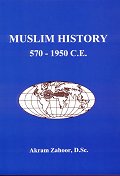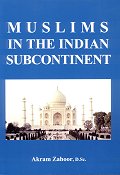This material may not be published, edited, or rewritten. Copyrights and Terms of Use.

Maulana Muhammad Ali instilled courage and confidence in the hearts of the ignorant masses who were sunk as if in deep slumber. He was largely instrumental in dispelling the inferiority complex resulting from incessant intimidation on many fronts. The extreme poverty and sufferings, to which the Indian masses were reduced to under the British Raj, added fuel to his fiery temperament. It was at a time when no other national leader had the vision and courage to speak on behalf of all Indians. When Sir Syed Ahmad Khan's policy of Muslim co-operation with the British Government failed miserably in uplifting the masses, the revolutionary policies of Maulana Muhammad Ali and Abul Kalam Azad took root among the Indian Muslims. Maulana Muhammad Ali towered high above his contemporary Indian politicians and was undoubtably a prince among the patriots.
Maulana Muhammad Ali's rise to Indian national scene began in the first decade of twentieth century with publication of his articles in the Times of India. His fame quickly towered high with the founding and publication of his English Weekly 'Comrade' on January 1, 1911. As the Editor, he expressed his views in flawless English, demonstrated a high standard of professional integrity, and was the first to protest against despotic press laws. The Weekly 'Comrade' became the voice of the struggle against exploitation and oppression of the British government, and it was recognized as the leading paper of independent journalism.
His editorials played a critical role in molding the political outlook of modern India. The Comrade was shut down several times forfeiting its security, including the instance when he wrote his famous 1914 editorial, 'The Choice of the Turks', which was a reply to the contemptuous article of the same title published in the London Times. He was interned for his timely writings as a journalist during the entire First World War, and subsequently, as the founder of Khilafat movement, a reformer and a leading political activist both in the Indian National Congress and the Muslim League.
In an editorial defending the Pan-Islamic Movement in India, he wrote, "Pan-Islamism when we consider its etymology is a meaningless issue of passion and prejudice. If it means anything, it refers to a community of sentiment and aspiration among the Musalmans of the world, as brought into existence by their religion. In that case Islam bears exactly the connotation, being the name of a set of beliefs and ideals common to the Muslim races. Interpreting the world in this sense no Muslim need be ashamed of its application. The sympathies of a Muslim are co-extensive with his religion, a race and a country has never captured him to the extent of the utter immersion in a narrow patriotism of the ideals which the acceptance of Islam had made obligatory. Territorial patriotism is not at all compatible with spiritual catholicity of a religion that has declared in a set of common ideals the brotherhood of man".
Maulana Muhammad Ali remained a dominant figure in every political and social reform deliberations in India until his death in 1931. In spite of his extremely busy schedule, he found time to write his autobiography 'My Life a Fragment'. The renowned English novelist H.G. Wells proclaimed, "Muhammad Ali possessed the pen of Macaulay, the tongue of Burke and the heart of Napoleon." Maulana Muhammad Ali is buried near the sacred Aqsa Mosque in Jerusalem.
Chronology of his life and freedom activities in the E-Book


E-Books on Islam and Muslims
Copyright © 1990, 1999 Dr. Z. Haq and Dr. A. Zahoor, All Rights Reserved.
This material may not be published, edited, or rewritten. Copyrights and Terms of Use.
Last Updated: June 2, 1999.
http://cyberistan.org/islamic/mmali.htm
![]()